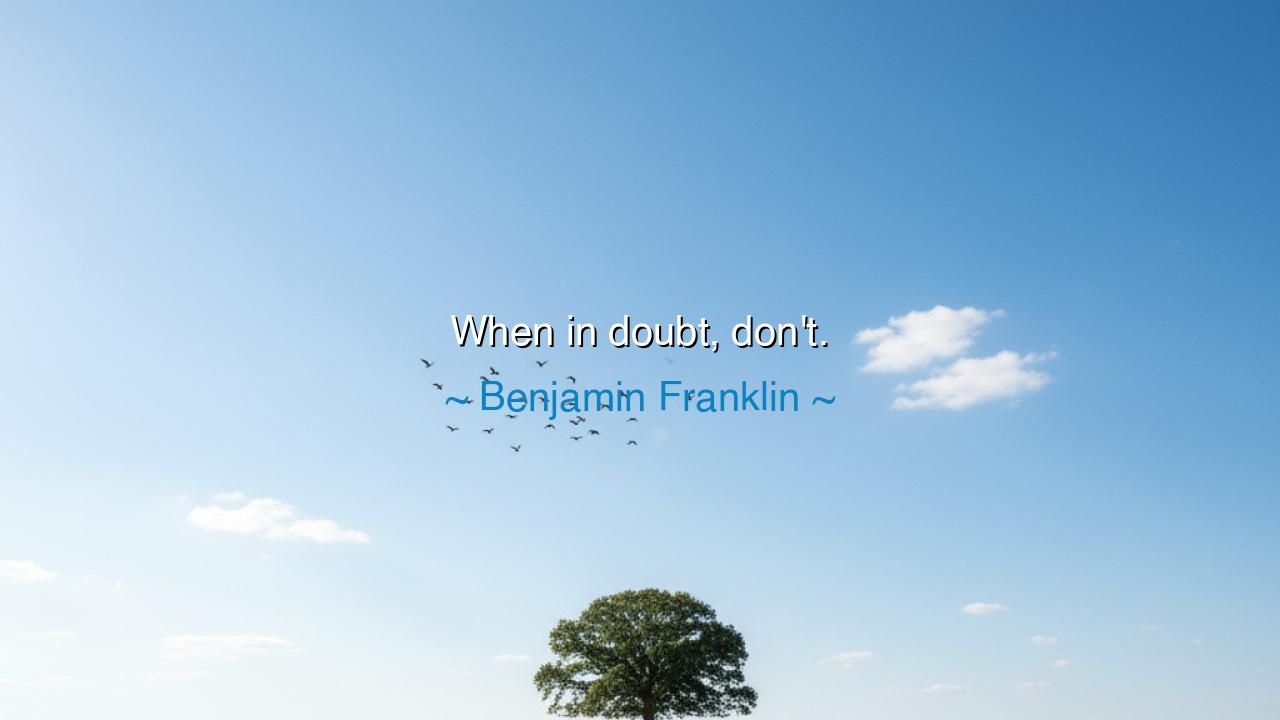
When in doubt, don't.






The counsel of Benjamin Franklin, “When in doubt, don’t,” is brief as a thunderclap, yet deep as an ocean. In its simplicity lies the armor of wisdom. To act in haste when the heart is clouded with uncertainty is to invite ruin, for what is doubt but the voice of conscience whispering caution? The ancients held that silence is sometimes stronger than speech, and restraint is often mightier than action. Franklin, master of prudence, gave this maxim as a lantern to those who walk the narrow path of decision.
For doubt is no enemy—it is the guardian at the gate, warning that the way ahead is unclear. To disregard it is to step into battle blindfolded, risking more than glory can repay. The wise do not fear pausing, for patience ripens truth, just as the sun ripens the fruit. A hasty deed may bind a man in chains, but a withheld hand rarely brings regret. Thus, Franklin’s words command us to respect the voice of hesitation, to let time unveil the hidden snare.
History offers its witness. Consider the tale of King Croesus of Lydia, who sought to wage war upon mighty Persia. He consulted the Oracle of Delphi, and received the cryptic reply: “If you cross the river, you will destroy a great empire.” Inflamed with ambition, he acted despite his doubt, believing the prophecy spoke of Persia’s fall. Yet it was his own empire that perished. Had Croesus heeded the unease within him, had he remembered, “When in doubt, don’t,” he might have preserved his throne and people. Instead, his haste carved his downfall.
Franklin’s wisdom, though born in the fires of a young America, is as old as the stars. It is the teaching that restraint is not weakness but strength. To stand still while others rush is the mark of the disciplined soul. To hold back when the heart trembles is to honor the inner guide, and in that stillness lies the power to choose rightly when the veil of uncertainty lifts.
Therefore, let the young and the bold learn this: when the path is misty, do not run headlong, for the abyss may lie hidden beneath your feet. Let your doubt be the herald of reflection, and in that reflection, find clarity. For the one who can master himself in hesitation shall master fate itself.






DTHoang Duc Thinh
Franklin’s quote sounds simple but offers deep wisdom. I can see how it applies to situations where a rushed decision could lead to regret. But is it possible that always waiting could make us overly cautious or even stagnant? How do we find the balance between being thoughtful and being too hesitant? Can there be times when acting on doubt can actually lead to growth and unexpected success?
DVDung Vi
I love how Franklin’s words promote taking a step back when feeling unsure. But, does this mean that all doubt should be avoided, or are there moments when we should push through our hesitation? Could it be that doubt is a sign that we need more information, or is Franklin suggesting that doubt itself is a warning to avoid any action? I’d love to hear different perspectives on this idea.
HGle thi ha giang
This quote strikes me as a reminder that sometimes doing nothing is better than doing something out of uncertainty. But is there a risk that this mindset might lead to indecision or missed chances? In a world where people are often encouraged to act fast, how do we balance careful consideration with the need to act promptly? Should there ever be exceptions to this rule?
TPLeu thu phuong
Franklin’s advice really resonates with me because it speaks to the value of caution. In today’s fast-paced world, we often feel pressured to make quick decisions, but is it always better to pause and think things through when we’re unsure? I wonder if, in some situations, this hesitation could actually cause us to miss opportunities. Can it be harmful to follow this advice too rigidly, or does it truly save us from regret?